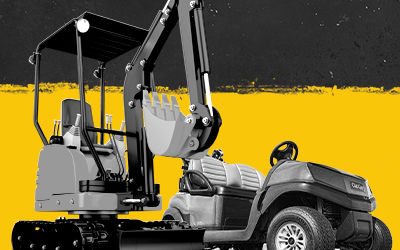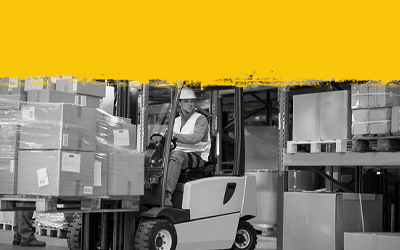Vanguard® Charged: Battery Sustainability

You’ve chosen a battery solution, and you’ve read up on how to safely use it. It’s almost time to power that battery up — but before you’re off and running, let’s answer a few final questions.
In the last installment of our Vanguard Charged series, we explain the sustainability of lead acid and lithium-ion batteries to help you understand the lifecycle of your battery and its impact on the environment.
Lithium-Ion Lifecycle
“Cradle-to-grave, lithium-ion batteries are better for the environment,” says Warren Corrado, product manager - alternative power, Briggs & Stratton. “It's cleaner to produce. It's cleaner to consume. It lasts longer in the field. Thus, you're not generating as much waste over the lifetime of the battery, and when it’s time for a new one, you can recycle it.”
That’s right, you can recycle lithium-ion batteries.
“Most folks are aware of the existing infrastructure to recycle lead-acid batteries, which was developed to handle the nickel cadmium batteries previously used in power tools. More than likely, you’ve used that infrastructure to recycle your car or golf cart battery,” says Corrado. “A similar infrastructure is developing for lithium-ion recycling, and Briggs & Stratton is partnering with experts to integrate these elements into its process.” You may have already seen recycling collection bins for lithium-ion tool batteries at retailers, such as Home Depot. There are also companies that handle the recycling needs for lithium-ion car batteries.
“Lithium-ion batteries in and of themselves are very recyclable, and the industry is quickly growing around that capability,” adds Corrado.
Vanguard Steps it Up
While all batteries contain materials that could be harmful to the environment if improperly disposed of, lead acid batteries present the added risk of possible sulfuric acid and/or lead leakage if damaged or improperly stored. Both materials can contaminate solid and ground water, and are linked to negative health effects in humans.
Lithium-ion batteries are not subject to the same ‘leakage’ concerns as lead acid. Regardless, the Vanguard team engineered the Vanguard Lithium-Ion Battery to be particularly environmentally stable and durable. “We have an Ingress Protection 67 dust and waterproof rating,” says Corrado. “That level of protection isn’t something many manufacturers are achieving.”
The IPC rating represents the degree of protection provided by mechanical casings and electrical enclosures against intrusion, dust, accidental contact, and water. The IP67 rating indicates that the Vanguard Lithium-Ion Battery can be dropped into up to a meter of water for half an hour without the battery being infiltrated.
“Basically, you could submerge the Vanguard Lithium-Ion Battery in water, or pressure wash it, or leave it outside in the elements — and you won't have moisture or water ingress damaging the pack,” says Corrado. “Whereas batteries with lower ratings could become unusable in those situations.”
While you should never intentionally place your battery in any of the aforementioned scenarios, the IPC67 rating ensures that were an accident to happen, the Vanguard battery would be protected. Eliminating a potentially wasted battery and any accompanying environmental impact caused by the damage.

A Greener Alternative
Batteries are a reliable alternative power source, and there are unique instances where a battery is the best choice for the job. “There's definitely applications where it's safer for operators and the environment to use a battery,” says Corrado. “Any indoor location, such as building construction after the walls and ceiling have been put in place.” The lack of emissions allows operators to safely continue working without concerns about emissions. Plus, the lack of noise and vibration offer a better operator experience for improved productivity.
“There are also applications where explosions due to environmental factors are a problem,” adds Corrado. “For example, natural gas drilling or oil fields are concerned about natural gas leaking out into the atmosphere and being pulled into running engines. Battery solutions are advantageous in these applications, as it eliminates those concerns.” The opportunity to power equipment without combustion can greatly enhance productivity on job sites where open flames and sparking is a major concern.
Lead Acid or Lithium-Ion?
We’ve explored a lot of aspects of lead acid and lithium-ion batteries in this series. From the performance capabilities, to the safety of both battery types to the environmental risks and applications. By now, you may be wondering how you can spec a battery solution on your equipment.
If lithium-ion batteries sound right for your application, look no further than the Vanguard Lithium-Ion Battery Pack. Designed as a flexible,integrated electrification solution capable of providing one half-kWh up to 20kWh of power, the battery pack is a critical offering in a marketplace increasingly demanding emissions-free and sustainable alternatives. Delivering versatile power and performance, the Vanguard Battery Pack is up to the task.
Are you ready to discover if the Vanguard Lithium-Ion Battery Pack is right for you? Contact us today.




